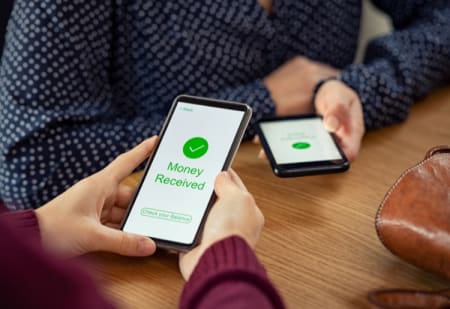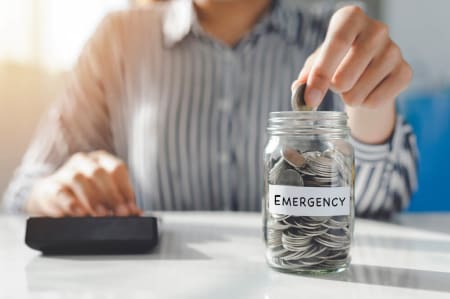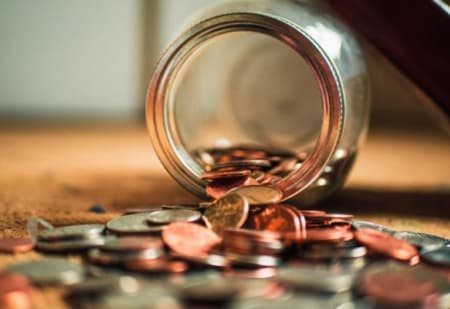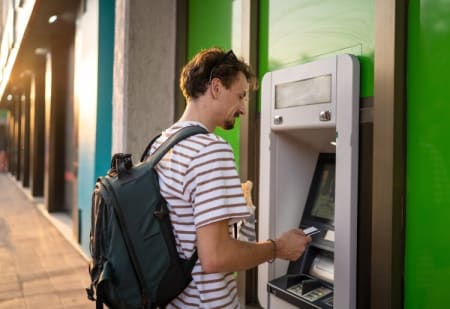Online Banking Articles & Guides
Learn more about online banking. Explore different account types and stay up to date with useful information and banking advice.
This site is a free online resource that strives to offer helpful content and comparison features to our visitors. We accept advertising compensation from companies that appear on the site, which may impact the location and order in which brands (and/or their products) are presented, and may also impact the score that is assigned to it. Company listings on this page DO NOT imply endorsement. We do not feature all providers on the market. Except as expressly set forth in our Terms of Use, all representations and warranties regarding the information presented on this page are disclaimed. The information, including pricing, which appears on this site is subject to change at any time.

Our Best Checking Accounts for 2025
A checking account is a bank account that centralizes your daily financial transactions.

What Is Overdraft Protection? A Complete Guide to Safeguarding Your Finances
If you spend more money than you have in your checking account, your balance will go negative, and your bank will charge you an overdraft fee. Overdraft protection is a feature offered by many banks to help you avoid these fees by covering transactions when your account is overdrawn.

Bank vs. Credit Union: What’s The Difference?
Choosing between a bank and credit union means weighing personalized service against modern convenience. Here's what you need to know.

How to Transfer Money From One Bank to Another
If you have ever needed to settle up with a friend after dinner or shuffle some cash between accounts at multiple banks, you’ll know there are several ways to do so.

8 Good Reasons to Spend Money from Your Emergency Fund
You've probably heard about the importance of having an emergency fund. Most financial experts recommend storing three-to-six months of expenses in an accessible savings account in case of a financial crisis — like unemployment or an unexpected expense.

What Is Annual Percentage Yield (APY)?
You may notice if you’re shopping for a savings account that banks advertise both an interest rate and an annual percentage rate, or APY. While an account’s interest rate can give you a basic idea of how much you can earn on your deposits, its APY gives you a better picture of your potential returns.

Our Best High-Yield Savings Accounts of 2025
Standard savings accounts provide a safe place to store your money, but pay very little interest, limiting your returns.

How to Switch Banks: A Step-by-Step Guide
Switching banks can be daunting, but sometimes it's necessary to find better services, lower fees, or improved customer support.

The Best Student Banking Account Options in 2025
However, financial independence also means taking responsibility for managing your money and navigating the often confusing world of financial terminology.

How Many Bank Accounts Should I Have?
Managing your money can be complicated on its own, but juggling funds in multiple accounts can add another layer of difficulty to your financial planning. Still, having multiple bank accounts can offer many benefits, depending on your financial goals.

Typical Minimum Balances to Open a Savings Account
When you open a savings account, there are several requirements to keep an eye out for, including monthly maintenance fees, initial deposits and minimum balances.

Are No-Fees Banks Becoming the Norm?
Find out how digital banking is disrupting the scene in major ways and how you can take advantage of no or low-fee financial products in 2025.

How to Apply and Qualify for Second Chance Banking
Second chance bank accounts are checking accounts that you may be able to open even if you’ve consistently been denied when trying to open checking accounts at major banks. In this guide, we’ll explain how second chance banking works and review the 3 best second chance bank accounts you can apply for today.

Millennials and Gen Zers Are Disrupting Online Banking
The bank branch as we know it could soon become a relic of the recent past, like the telephone box and Rolodex. That’s because people in their twenties and mid-thirties are embracing digital banking more quickly than their older counterparts.

Enjoy the Best of Both Worlds with a Money Market Account
Money market accounts are savings deposit accounts that are offered by many different banks, credit unions, and other financial institutions. They are a popular option if you want to make the most of your savings, offering savers a way to enjoy higher interest rates without giving up on easy access to funds.

5 Reasons You Need a Separate Bank Account for Your LLC
An LLC—or Limited Liability Company—is a legal entity that protects business owners’ personal assets from liability related to their business. It’s a critical structure to make sure that your business and personal finances are separate. This is especially true if you’re a sole proprietor or someone who owns an unincorporated business on your own.

How To Open A Savings Account For A Child
A child savings account does more than store money—it's a hands-on tool that can shape your child's financial future.

Where Can I Exchange Foreign Currency?
Planning an international trip raises an important question: Where can I exchange foreign currency?

How to Close a Bank Account
In this article, we’ll break down how you can close your bank account properly, the steps you need to take, and some considerations before shutting down your old account.

What You Need to Know Before Opening a High Yield Savings Account
Whether you’re just entering the workforce or getting ready to retire, it’s important to have a rainy day fund where you can sock away some of your hard-earned cash. A high yield savings account may be just what you need to help you store money thanks to its combination of liquidity, return on investment, and cost.

How Banks Are Building Trust with Customers in 2025
While the 2008 financial crisis has deteriorated Americans’ trust in banks to a record low, the last few years may have actually been a turning point for the good.

Make the Most of Your Money with a High-Yield CD Account
If you're looking to save your money, you should consider using a Certificate of Deposit, or CD account. CDs are increasingly popular and for good reason. They are savings funds that promise a higher, fixed rate of interest, in exchange for locking your money away for specific amounts of time. Here’s everything you need to know about choosing a CD.

Should You Invest or Put Your Money Into a Savings Account?
The stock market is up 13% year-to-date, house prices are high, and your friend is telling you to buy Bitcoin. With so many ways to invest money, is a savings account worth considering? We run the ruler over the pros and cons of opening an online savings account.

A Step by Step Guide to Opening an Online Bank Account
Whether it’s grocery shopping, getting a mortgage, or managing your money—doing things online is more convenient. Most major banks let you do some things with online banking or even mobile banking, but they generally still require you to turn up in person to open an account.

How To Open A Bank Account: Everything You Need
You can streamline opening a bank account by collecting the necessary identification documents, preparing financially to fund the account, and choosing the best account and bank for your financial objectives.

How to Choose the Right Online Bank for You
So, you’ve decided to open an account with an online bank? Online banks offer many benefits over regular banks, including more convenience, lower fees, and no waiting in lines.

How Online Banking Can Keep You Safe
Until recently, using online banking services was an alternative to going to your good old brick-and-mortar bank. But nowadays, digital banking is the only way to go.

What Is a Savings Account and How Does it Work?
A savings account is a type of bank account that allows you to store your money in a safe place and earn interest. The rules and interest rates vary from bank to bank. Some savings accounts require a minimum balance, while others don’t have any requirements. The average APY, or annual percentage yield, for savings accounts is currently around 0.10%. Top online banks promise APYs as high as 2.25%.

5 Steps for Switching to an Online Bank
Surveys over the years have consistently shown that most Americans prefer to stick with their existing bank even when they know they are being charged too much.

12 Ways to Boost Your Savings
With inflation soaring and everyday expenses becoming increasingly unaffordable, saving is more of a challenge than ever for many Americans. However, while times are undeniably tough, there are things you can do to help you save as much as possible and get the most competitive return on the funds you do have. Here are our top 12 tips for boosting savings during these challenging times.

Is Online Banking Safe? Know the Risks and How To Protect Yourself
Online banking is the new standard, and beyond being convenient, it's also relatively safe. However, there are risks involved in digitally sharing your personal and financial information. Here's what you need to know to keep your money safe the next time you bank online.

Simple Interest vs. Compound Interest: What's the Difference?
Interest — or a surcharge applied when you borrow money — is a reality of most financial products. But interest comes in different forms, so it’s important to understand how charges apply before signing up for any loan or investment.

Simple Interest: How it Works and Who its Best For
When you borrow money, you are almost always responsible for paying interest or a charge associated with repaying what you owe. In the same vein, when you save or invest money with a financial institution, it will likely pay you interest in exchange for banking or investing with them.

2025 Savings Rate Forecast: Will Rates Drop?
In the last few years, consumers have enjoyed record-high annual percentage yields (APYs) on their savings accounts, thanks primarily to the Federal Reserve raising its federal funds rate in an effort to curb inflation. Inflation slowed in 2024, though, and savings rates fell in tandem during the last quarter.

How We Rate and Select Top Online Banks and Financial Institutions
We’ve created the following process to identify the most suitable online banking companies for your needs and deliver on our mission to help you make informed decisions.

What You Need to Know to Get The Best CD Rates in 2025
A CD, or certificate of deposit, is a savings product offered by banks and credit unions, which pays a fixed rate of interest for a set period of time. To make CDs more appealing, CD rates are typically higher than savings accounts rates. CDs with longer terms (the amount of time you lock your money away) typically carry higher interest rates. So how can you make sure to get the best CD rates?

How to Transfer Apple Cash to Your Bank: Step-by-Step Instructions
From coffee runs to splitting bills, Apple Cash has changed how we handle day-to-day expenses.

ATM Withdrawal Limits: Everything You Need to Know
Ever hit an unexpected ATM withdrawal limit when you needed cash? You're not alone.

72% of Gen Z Favors Online-Only Banking for Managing Finances
Are traditional banks keeping up with the times? As the world becomes increasingly digital, younger generations demand banking solutions that align with their tech-savvy lifestyles. Gen Z, born between 1997 and 2012, is at the forefront of this digital banking revolution.

Small Business Owners, Choose an Account That Fits Your Lifestyle
So, you’re setting up a new business, and there are plenty of exciting decisions to make. What should you name your company? How many employees should you hire? Do you need a website? Although questions relating to your business checking account may not be as exciting, choosing the right banking product could play a vital role in ensuring your day-to-day operations run as smoothly as possible.

MMA vs. CD Accounts: Which Should Be Your Choice?
Certificates of Deposit (CDs) and Money Market Accounts (MMAs) can be excellent options for those looking to earn more interest on their savings. However, in order to know which product is right for you, it’s important to learn about the pros and cons of each, as well as any possible strings it may come attached to.

